A few days ago, Chris Shugart of T-Nation once again made a complete fool of himself when he tried to tackle the topic of “fasted morning lifting and potential muscle loss” and could not even differentiate between deceived unhealthy people consuming carbohydrates and running on a glucose metabolism and those who are healthy running on our natural fat metabolism, as in being in ketosis.
This time T-Nation tried to explore the topic of “low-carb” diets and “changes in testosterone.” Will they be able to differentiate between damaged people who are dependent on carbohydrates as in running on a toxic glucose metabolism, those just switching to a “low-carb” or “ketogenic diet” and going through an adaptation phase that takes a minimum of 12 to 26 weeks, or those who have been following our natural diet for at least 6 months to a year and are fully fat adapted and can produce both ketones and glucose to fill all our energy needs?

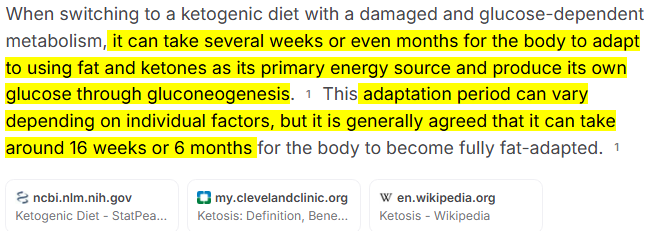
Of course they won’t. So, let’s see how much they f**ked up this topic.
“You’ve probably heard that low-carb diets reduce your natural testosterone production. Or maybe you’ve heard that low-carb diets increase testosterone production. So, which is it?”
Switching from a toxic and damaging diet with carbohydrates to a more healthy fat-dominant diet without carbohydrates can initially lower testosterone by 10 to 15% or so due to changes in insulin production and overall adaptation processes. This is not a bad thing, it’s simply a natural reaction and once the person has re-adapted to his or her natural high-fat diet, hormones will actually increase and be closer to their optimal levels than ever before. In men that means that once you have re-adapted, which might take 8, 12, 16, 26 weeks or more, your testosterone levels will be higher. So, in that regard both statements are correct, but none of them reveals the whole picture — which I just did.
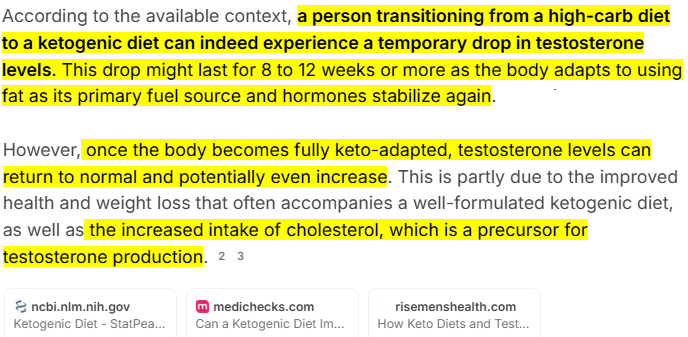

What We Know
We? As in the backwards bought-and-paid-for “nutritional science,” or you, the imbeciles at T-nation? Well, both of you will be wrong as f**k either way.
“If we examine dozens of studies (and we did), here’s what we can conclude:”
Studies you say? Did you make sure that any studies on “very low carb diets” or “ketogenic diets” registered their starting hormone levels, as in before transitioning to a ketogenic diet, and then a year later or so, they took new measurements and made the comparison?
Well, very few if any such studies exist. Most are only 8 to 16 weeks. They simply take measurements during the weeks they switched to the ketogenic diet and while the participant’s bodies struggled to re-adapt to our natural fat metabolism. So, all those readings and measurements are totally irrelevant — as we have already established above.
“Some very low-carb or keto diets can lower testosterone levels by a little or a lot. This drop is usually temporary, but not always. Low-carb eating can also boost testosterone levels… or maybe it’ll do nothing at all.”
I already explained the lowering of testosterone, and it’s always temporary unless you starve yourself, as in doing a retarded fat loss or “very low calorie diet” (VLCD) or doing a ketogenic diet low in animal fats and high in toxic and useless seed/vegetable oils.
Also, this drop in testosterone usually happens in those who are fairly active and have relied on carbohydrates and a higher insulin production for a long time — which also means that they will re-adapt to our natural fat metabolism much slower.
The few that might experience a small increase in testosterone during the adaptation phase are those who are less active and have not been that high-carb as the previous group. They might even have had days of “low-carb eating” as part of their lifestyle, and thus have an easier time re-adapting to a natural fat-dominant diet.
“Listen to the science, they say. But the science is all over the place. So, let’s break it down simply and look at some ways to optimize low-carb diets without risking any hormonal havoc.”
Yes, it might seem that “the science is all over the place,” but that is because the majority of all people, including those doing these trials and studies, and you at T-Nation, have been conditioned and brainwashed by the false narrative that carbohydrates are a part of the human diet or even “needed.” Most people do not understand that being in ketosis and running on a fat metabolism is our natural metabolic state. And most people don’t even know that humans are obligate hyper carnivores, made to only consume the flesh and fat of animals and the occasional eggs and raw dairy.




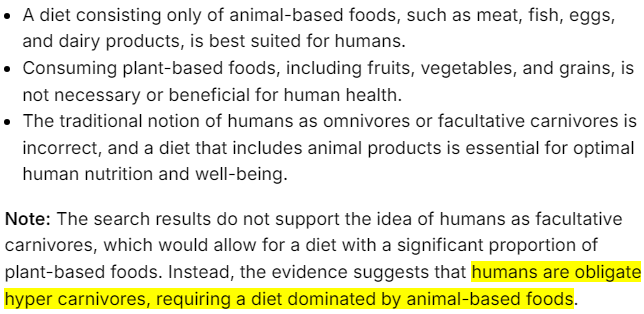
This is why “the science is all over the place,” as they do not understand the extreme damage caused by carbohydrates, by seed/vegetable oils, and other plant-based chemicals and compounds, and that it takes a lot of time to re-adapt to our natural fat metabolism. While most somewhat healthy people can re-adapt in 12 to 26 weeks, it can take up to a year for others and then you also have a lot of healing and repair to do, which takes several years.
With that said, most people will notice improvements after 8 weeks, and major improvements after 26 to 52 weeks — and from there, it just continues — everything will be way better than it was previously on a toxic carbohydrate-dominant diet.
If the researchers behind nutritional trials and studies do not respect these physiological facts and simply throw their subjects into a new diet and start recording data, the collected data will be all over the place and totally useless.
What is Low-Carb Exactly?
“In the studies we examined, it varies. For a very low-carb (VLC) diet, many studies consider that to be 5% of total calorie intake, which might be around 25 grams daily for a person on a 2000-calorie diet. Other studies define low-carb as 50 grams or below, though a person may need fewer (20-30g) if the goal is ketosis.”
Yes, this is also extremely important. The less carbohydrates, the deeper the “state of ketosis” will be, and the faster the re-adaptation will be (as in closer to the numbers I mentioned earlier, as in 12 to 26 weeks.) You should preferably be way below 25 grams. If you follow our natural human carnivore diet, the only “carbs” you will get will be negligible, as the animals are not fed the day before slaughter and the little muscle glycogen that is present is converted into glucose and then metabolized into lactic acid during rigor mortis.
So, preferably you should be below 5 grams of naturally occurring glucose/carbs a day.
Anyone doing around 25 to 50 grams of “low-carb” a day will only just tap into ketosis unless they’re very active, and thus re-adaptation will take much longer, making the studies even more useless, and also very retarded, as they simply yell-in-your-face that the authors do not understand simple physiology and biochemistry.



How Low Carbs Can Lower T
Again, this is only during the initial re-adaptation phase, as in perhaps the first 8 to 16 weeks of adopting a natural high-fat and very low-carb diet.
“Carbohydrates influence insulin levels, which can affect testosterone production. Insulin enhances glucose uptake in cells, including Leydig cells in the testes, where testosterone is synthesized. A VLC diet, by drastically reducing carbs, lowers insulin levels, potentially limiting this support mechanism.”
Yes, however, the sensitivity of all cells will increase as they heal from the damage they have taken from all the unnatural high levels of blood glucose. So, this is very temporary. Also, it will not make any significant impact as you likely have reduced a lot of stress factors by adopting a healthier fat-based diet, and thus your hormones will be able to actually do their job better.
Slightly lower testosterone in a healthier body will be better than slightly higher levels in an unhealthy body that is struggling with daily toxicity. That is common sense.
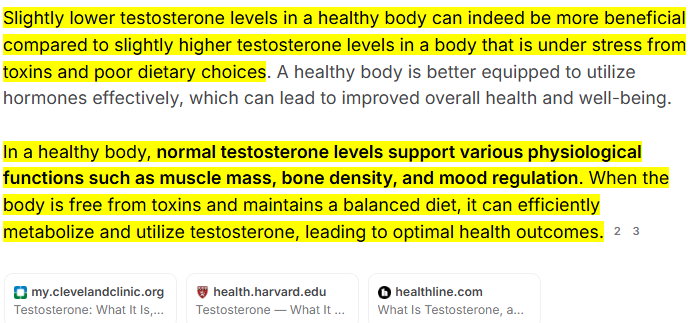
And as a toxic body recovers and heals, and testosterone increases after the re-adaptation phase, that testosterone will be even more potent than before as the body is actually under a lot less stress and can function as intended. That’s a double win.
“Research, such as a 2021 study published in Nutrients, found that men on a ketogenic diet (less than 50g carbs/day) for 8 weeks experienced a slight decline in total testosterone compared to a control group on a standard diet. The reduction was attributed to lower insulin and possible stress on metabolic pathways.”
For eight weeks, and on a hefty 50 grams of carbs a day! These poor people hardly tapped into ketosis and the researchers only registered their hormone levels for 8 weeks while their bodies struggled in a gray zone to adapt to a more dominant fat metabolism. Extremely retarded. Such studies really show how ignorant these so-called researchers are. And even more embarrassing is the fact that you at T-Nation even mentioned this “study” in your “research.” Shameful!

“VLC diets can increase cortisol levels due to the body’s adaptation to ketosis, where glycogen depletion triggers a stress response via the HPA axis. Elevated cortisol can suppress T production through negative feedback on the HPG axis. A study in The Journal of Strength and Conditioning Research observed that athletes on VLC diets showed higher cortisol and lower testosterone-to-cortisol ratios, suggesting a catabolic shift.”
No, it’s not a stress-response you frikkin’ dimwits. I’ve explained this in detail in my article “All Sugars/Carbohydrates Turn into Toxic Glucose.” Cortisol helps the body with releasing stored glycogen through its natural process of gluconeogenesis, which is converted into glucose to fuel the tissues that need it. In that sense, cortisol mobilizes and is highest in the early morning to wake you up and to help fuel you as you go hunting and looking for food. When you do not force-feed yourself with toxic carbohydrates, as in running on our natural fat metabolism, your cortisol levels are naturally higher in the morning and forenoon, and then cortisol declines during the day to be the lowest in the evening, priming you for sleep. That is our natural cortisol cycle.

And natural levels of cortisol do not suppress testosterone production. T-suppression can only happen with unnaturally high cortisol, as when your body is going through a stress response, as in a fight-or-flight scenario. This might initially happen if you are a carb-addict and switch to a ketogenic diet overnight as the body struggles to re-adapt. However, in more healthy people transitioning from a carb-dominant to a ketogenic diet, this will not be an issue even if cortisol goes up a little bit, which is fully natural and also needed for sustaining our natural fat metabolism and providing tissues with glucose through gluconeogenesis.
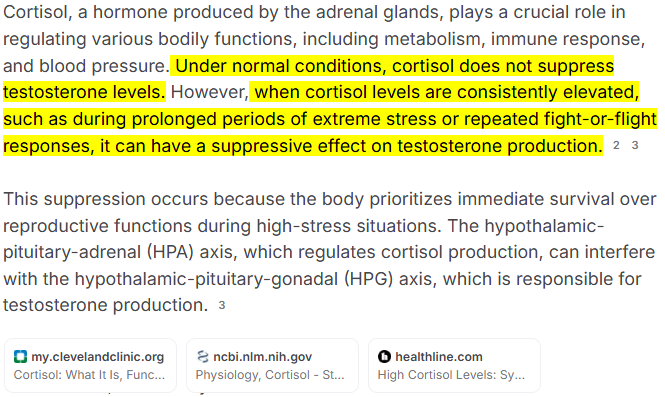
Sheesh, these people are extremely ignorant of simple physiology.
“Many VLC diet studies involve caloric restriction (most low-carbers are dieting for fat loss, after all), which independently lowers testosterone. A review in Hormones and Behavior noted that energy deficits, regardless of macronutrient composition, reduce luteinizing hormone (LH) pulsatility, impairing testosterone synthesis. If a VLC diet is hypocaloric (low calorie), this could exacerbate testosterone reductions.”
For f**ks sake. A heavily restricted diet, as in a retarded fat loss or “very low calorie diet (VLCD,)” no matter the composition, will not provide enough nutrients to sustain all bodily functions, including hormone production. If you starve yourself for weeks, your testosterone will plummet no matter the macronutrient ratios. Again, that is common sense. And what the heck does these starvation diets have to do with “low-carb diets” and its effect on testosterone? Again, shameful.
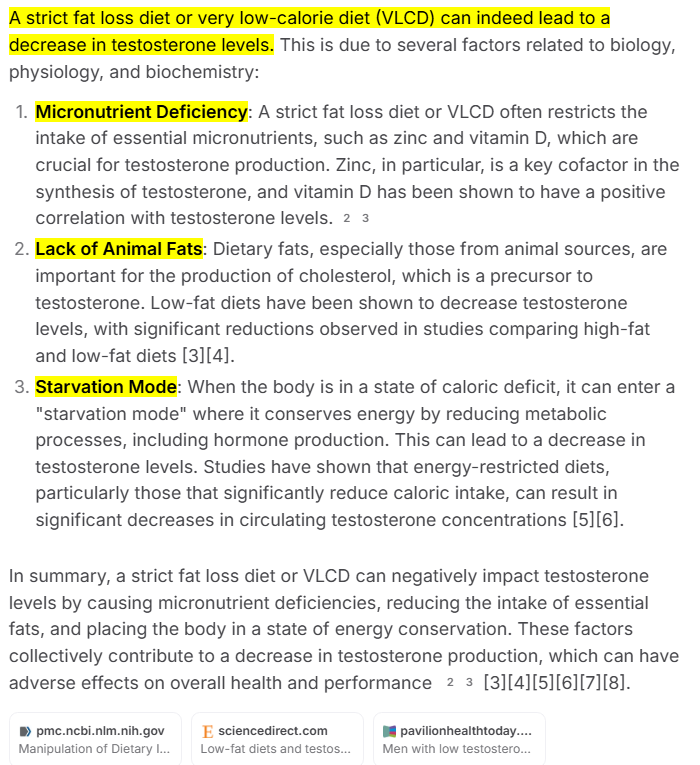
“A VLC diet’s effect on testosterone may depend on the dieter. Lifting can mitigate testosterone declines by stimulating the HPG axis. One study showed that keto-adapted athletes maintained testosterone with heavy lifting, unlike sedentary people. (Lesson: If you’re going to do a low-carb diet, lift weights.)”
Now you mention “keto-adapted athletes” all of a sudden, likely because you came across that word in a paper. Did that word not pose questions in your minds? Such as “what is this adaptation?” “How long does it take?” “How does it change the metabolic pathways?” “Is this not relevant to study outcomes?”
And lifting weights will only stimulate testosterone during the latter part of the lifting session and for an hour or so afterwards, unless you overdo yourself, as in lifting hard for more than an hour, then it will lower your testosterone instead. So, it’s not really relevant. The increased testosterone in the “keto-adapted athletes” came from the adaptation and the fact that they are healthier and do not experience the same toxic load as those consuming carbohydrates.
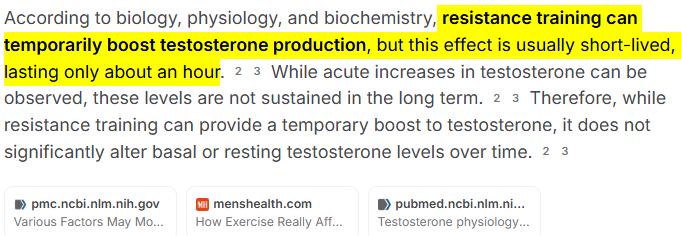
“Initial drops in testosterone on VLC diets may reflect an adaptation phase (2-4 weeks) as the body shifts to fat metabolism. A study in Sports Medicine found that after keto-adaptation (8-12 weeks), T levels often stabilized or returned to baseline in trained individuals, suggesting that acute reductions may not persist.”
There you go. But an “adaptation phase” is not 2 to 4 weeks, you dimwits. It’s a minimum of 8 to 12 weeks in healthy people who have been somewhat low carb before, and about 16 to 26 weeks for most people. And 8 to 12 weeks of adaptation as mentioned in the study from Sports medicine was in trained individuals, which means that they are very active, speeding up the adaptation phase. However, I find it amusing that you first claim 2-4 weeks for adaptation, which is complete nonsense, and then you cite a study which claims 8-12 weeks for adaptation and stabilization of testosterone levels.
So, now of a sudden you acknowledge an re-adaptation phase in those who are doing VLC and ketogenic diets, but you still do not understand the implication on this in studies and recorded data, nor the fact that if properly maintained and especially if you consume enough animal-based food, once fully fat adapted, testosterone will increase way past previous levels. Because if you did, most of the points you listed above would have been totally pointless or would have read as my comments did. You frikkin’ imbeciles.
How Low Carbs Can Boost T
“VLC diets, particularly keto, are typically high in fat. Dietary fats (especially saturated and monounsaturated) are precursors to steroid hormone synthesis, including testosterone. A study in The Journal of Clinical Endocrinology & Metabolism found that higher fat intake correlated with increased T levels in men, suggesting that the high-fat component of VLC diets could offset carbohydrate loss. So, a man who’d been eating a very low-fat diet might see a T boost on a low-carb plan with adequate fats.”
Yes, saturated fats are important for hormone production, and they can ONLY be found in ANIMAL-BASED FOODS. Forget about “saturated fats” from plants such as coconut as they are not really “saturated” more than in a “classification sense,” as they are not in the same chemical structure as saturated fats found in animals or their produce. A huge difference!

Also, and much more important, are cholesterol which is vital for hormone production, and again, cholesterol is only found in animal-based foods. And while our bodies can produce up to 80% of the cholesterol we need, it needs saturated fat, as in animal fat, to do so. So, this is why vegans turn into soy boys and lose their masculinity rather quickly as they get no life-sustaining cholesterol from their diet, and their diet also lacks the building blocks for cholesterol. Not to mention that the brain needs both saturated fats and a lot of cholesterol, hence the nickname vegtards.

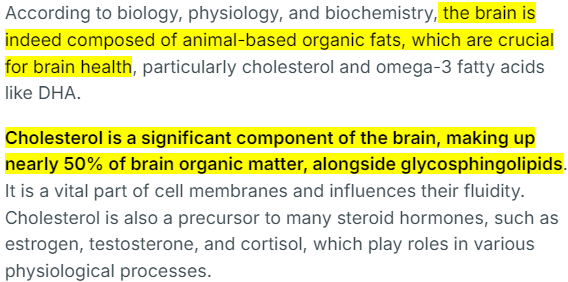
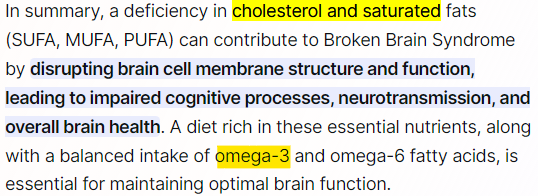
“Moderate protein intake in VLC diets (often 15-25% of calories) may support testosterone. If protein remains sufficient, the anabolic environment could be preserved despite low carbs.”
The T-Nation staff sure are way out of their depth on this one. Embarrassing. And not “despite low carb,” you imbeciles. You need adequate protein for not only tissue remodeling, but also for enzymatic processes and hormone production. So, getting enough protein is critical, just as getting plenty of saturated fats and cholesterol. It has absolutely nothing to do with carbs. Sheesh.
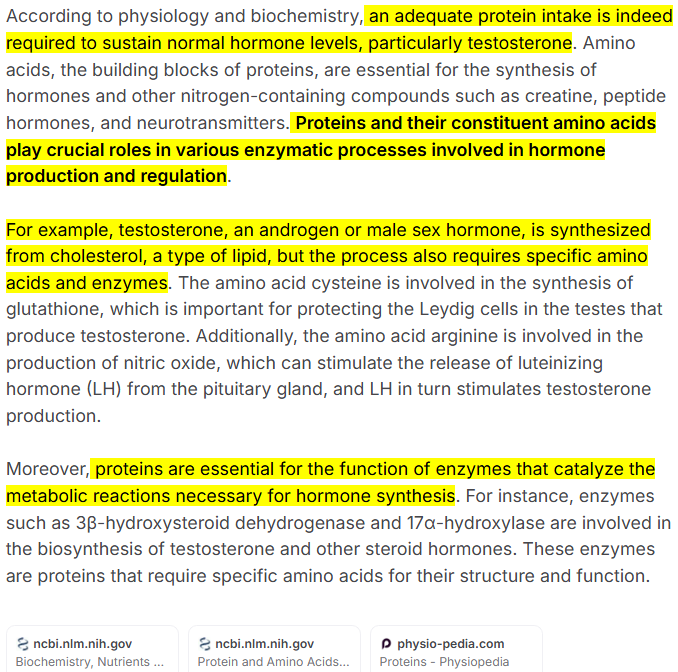
Final Answer?
“Very low-carb diets can reduce testosterone levels, particularly in the short term, in sedentary individuals, or when paired with caloric deficits due to lower insulin, elevated cortisol, and metabolic stress. However, they don’t universally reduce testosterone. With sufficient fat and protein intake, adaptation over time, and resistance training, T levels may stabilize or even increase.”
You almost got it right, although none of your previous bullet points showed any of this, as in adaptation over time. So no, they do not “universally reduce testosterone.”
To summarize the actual facts, testosterone can initially drop a few percent in individuals who have caused a lot of damage to their bodies and have trouble re-adapting to our natural fat metabolism, as it will take some time for them, and during that time T-levels might decline a little before they shoot up again and then really rise above and beyond, blowing their previous levels out of the water.
So, the real take home message is that your testosterone levels will be much higher once you have re-adapted to our natural fat metabolism by following our species-appropriate, species-specific natural diet of animal-based foods. And not only that, your testosterone will be more “potent” as your body is healthier and can utilize its hormones better. Also, you will have virtually unlimited energy and perform a lot better than any fool consuming carbohydrates. A total win-win. But T-Nation will never tell you this as they make a living deceiving people to buy their toxic supplements, which several of them contain carbohydrates and other very damaging toxins. So, instead, they will do as any “health” or “diet” influencer does, as in playing both sides, so they can sell their carb supplements to deceived junkies and other protein and non-carb supplements, including toxic and non-working “testosterone boosters” to low-carb dieters.
Well, I used to be part of the supplement industry myself (1999 to 2014,) having developed more than 10 supplements and had my hand in hundreds more. I also worked with elite athletes and in pharmacology. I could have stayed on that path and made millions, but once you face death and really connect to nature and finally understand biology, physiology, and biochemistry you can’t hide from the truth unless you’re a full-blown psychopath. Instead, I will tell you like it is, and it’s up to you to look into it further and/or simply try it. Thousands of people have done so, and many have reached out and thanked me for saving their lives. That is a lot more precious and rewarding than a few millions in the bank from deceiving and hurting people.
Take note, T-Nation.
If you need help with any kind of health problems or transitioning from your current way of eating to our natural species-appropriate, species-specific way of eating, I’m available for both coaching and consultation.
Coaching and Consultation
And if you found the article and my insights helpful and enjoy my daily free information, please consider donating to help pay the webhosting bills and keep the site running. And if you’re interested in discussing and sharing information with likeminded people, consider joining our uncensored community at Ungovernable.se. Thank you!

